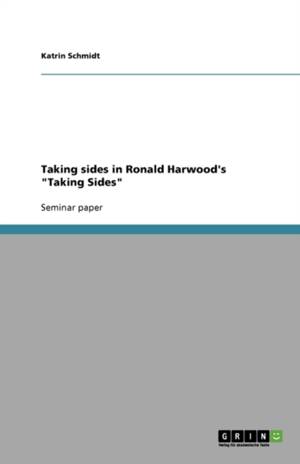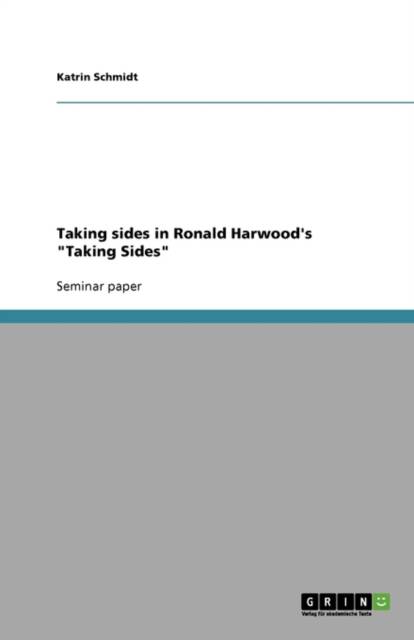
- Retrait gratuit dans votre magasin Club
- 7.000.000 titres dans notre catalogue
- Payer en toute sécurité
- Toujours un magasin près de chez vous
- Retrait gratuit dans votre magasin Club
- 7.000.0000 titres dans notre catalogue
- Payer en toute sécurité
- Toujours un magasin près de chez vous
23,45 €
+ 46 points
Description
Seminar paper from the year 2006 in the subject English Language and Literature Studies - Literature, grade: 2,0, University of Münster (Englisches Seminar), language: English, abstract: Introduction Wilhelm Furtwängler was a renowned German conductor before, during and after the Third Reich. He is still known today not least because of his ambiguous relationship with National Socialism. The playwright Ronald Harwood wrote a play named Taking Sides about Furtwängler's denazification trial. The title appeals to the audience to take sides rather than summing up the plot of the play. Harwood makes his audience witness a dialogue of two contrasting perspectives: Furtwängler, on the one hand who is convinced of his innocence, and on the other, there is American investigator Major Arnold whose aim is to prove Furtwängler's guilt. In the end it is up to the audience to take sides (cf. Glaap 2003, p. 13). Questions the playwright poses at his audience are: "Why did Furtwängler stay in Germany whereas many other artists emigrated? (How) Did he manage to conduct the Berlin Philharmonic without making a deal with high-rank Nazis? Did he make up for his guilt by helping some Jews to escape? Can Arnold be interpreted as advocate of the Third Reich's victims? (cf. ibid.). This essay is not meant to finally expose the truth about Furtwängler's guilt or innocence; other scholars have attempted to do that. Rather, my interest lies in revealing if Harwood succeeded in creating a neutral play that appeals to the audience to take sides without revealing his own personal opinion. With this working hypothesis I want to start by examining Harwood's motivation to write the play. As a next step the importance of the setting will be examined. When analysing Harwood's choice of characters and their function concerning their questioning or their support of Furtwängler, I will also examine Furtwängler's role in the Third Reich as background information. By doing that, arguments taking sides
Spécifications
Parties prenantes
- Auteur(s) :
- Editeur:
Contenu
- Nombre de pages :
- 24
- Langue:
- Anglais
Caractéristiques
- EAN:
- 9783638953825
- Date de parution :
- 25-06-08
- Format:
- Livre broché
- Format numérique:
- Trade paperback (VS)
- Dimensions :
- 148 mm x 210 mm
- Poids :
- 45 g

Les avis
Nous publions uniquement les avis qui respectent les conditions requises. Consultez nos conditions pour les avis.






